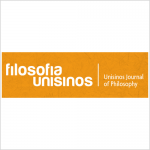Will to cruelty in Nietzsche’s tragic writings
Vol 9, No 2 (2008) • Filosofia Unisinos - Unisinos Journal of Philosophy
Autor: Rogério Miranda de Almeida
Resumo:
This text aims at showing how the problem of cruelty is already present in Nietzsche’s early texts, which I call “tragic writings”. It is true that the concept of will to power and the destructive drives that it contains will become fully explicit only during the third and last period of Nietzsche’s productive life. Nonetheless, the issue of forces and their relation permeates and fundamentally marks the reflections the philosopher develops from 1869 onwards on tragedy and Hellenic civilization. Thus, besides tragedy as such, he analyzes the role that art, politics, religion and the genius played in the formation and development of Greek life. The most important thing, however, is to notice that, together with the cruelty that characterizes the will in the “tragic writings”, there exists a delight emanating from the same will, a will that knows neither satisfaction nor end.
ISSN: ISSN: 1984-8234
Texto Completo: http://revistas.unisinos.br/index.php/filosofia/article/view/5351
Palavras-Chave: Nietzsche,will to power,cruelty,forces,deligh

Filosofia Unisinos - Unisinos Journal of Philosophy
The journal Filosofia Unisinos - Unisinos Journal of Philosophy is published once every four months by Universidade do Vale do Rio dos Sinos.
Articles must be original, unpublished, and not under consideration for publication anywhere else and can be written in Portuguese, English or Spanish
Filosofia Unisinos - Unisinos Journal of Philosophy prints articles, translations and critical book reviews. It also reprints papers that are considered fundamental to the area when authorized written permission is given by the original publisher.
